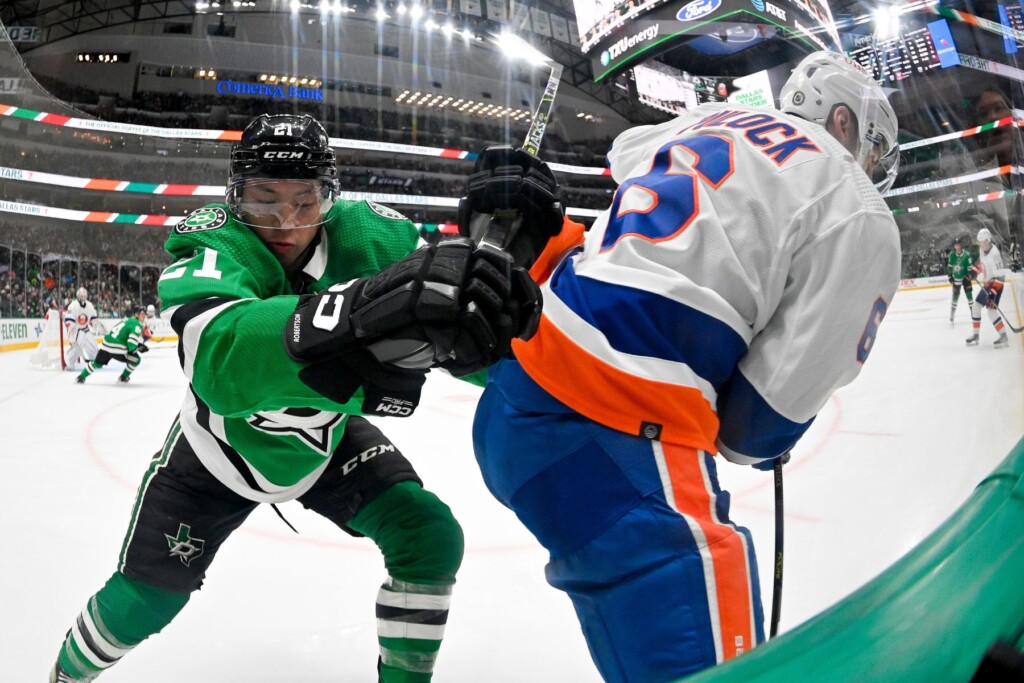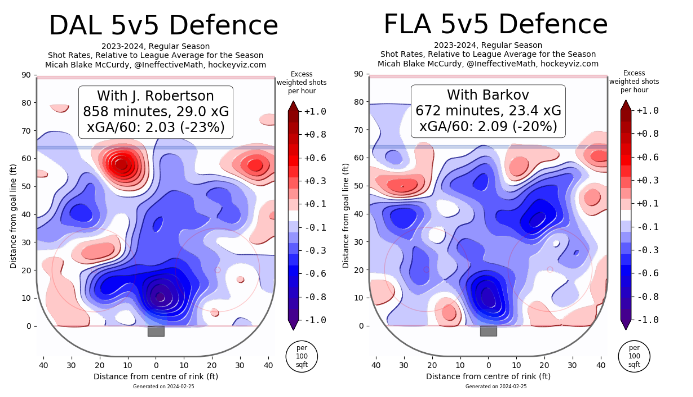The Stars are the second-highest-scoring team in the NHL, and Jason Robertson is leading the Stars in points. And yet his production this year has felt like a letdown.
That disappointment is a consequence of Robertson’s own success. After consecutive seasons putting up more than 40 goals, Robertson is on pace for a paltry-by-his-standards 26 goals this year. In other seasons, and perhaps other markets, Robertson would be answering questions every day about what’s wrong, what’s different, and how he’s dealing with the reality of not being on a 109-point pace. Perhaps we’d even be coming up with narratives about how he’s still leading the Stars in assists, and how that shows he’s more of a “playmaking forward” than a “pure goal-scorer,” as if a player can’t look like both at different times.
And perhaps if Robertson were a player solely defined by his scoring output, that would be the case. But this is Dallas, not Boston, and Robertson has been defying labels since his draft year in 2017. So it should come as little surprise that, just when everyone was ready to anoint him as the tip of the Stars’ offensive spear, Robertson has pivoted into a more subtle, more supercharged version of a young Loui Eriksson, with a game far more complete and complex than he often gets credit for.
Most fans know that Robertson fell to the second round of the draft because of his subpar skating. An otherwise elite talent, Robertson displayed footspeed that seemed like an Achilles heel, something that would prevent him from beating defenders and goalies in the NHL the same way he did in juniors. That obviously didn’t turn out to be the case, as Robertson became part of a triumvirate atop the best draft of Jim Nill’s tenure in Dallas.
If you want an example of how Robertson can score so often without an elite skating tool, check out this play from a couple of seasons ago. You’ll see Robertson using all of his 6-foot-3 frame to change sides with the puck and throw the defenseman off balance. Robertson isn’t quite deking. There’s not much deception going on there, really. He simply understands the limitations of the defender’s positioning and moves around him before firing the puck into the far side of the net on his off-wing. If there’s a trademark to Robertson’s offensive abilities, it’s how eerily simple he makes it look, even at lower speeds.
But the feel-good nature of Robertson’s conquering of criticism has sometimes oversimplified the metamorphosis of the elite winger. He hasn’t just proven he can be an NHL scorer despite not being as fast as Mike Modano, but he has also shown a penetrative understanding of the NHL game that allows him to use his preternatural abilities to dominate the game, including as a defensive forward.
While Robertson’s lack of time on the penalty kill will probably hamper his Selke Trophy case, his defensive impact is otherworldly. When he’s on the ice, it is extremely hard for the opponent to create quality scoring chances. Use the Selke favorite, the Florida Panthers’ Sasha Barkov as a comparison, and you’ll see that Robertson’s defensive-zone impact (23 percent better than league-average) is even stronger than Barkov’s:
For those more inclined to conventional stats, Robertson’s plus/minus is also quite healthy at plus-11, which is no small achievement given the ups and downs of the Stars’ goaltending this year.
But to dig back into the metrics for a moment, Robertson’s performance this year deserves even more context: per Natural Stat Trick, he has one of the best xGA (expected goals against) on the team, behind only the trio of Radek Faksa, Craig Smith, and Ty Dellandrea, all of whom play far fewer minutes against lesser competition and produce far less offense. Robertson’s plus/minus doesn’t quite reflect this, due to the Stars’ dip in goaltending performance this year that has let in a few more goals that usually get saved, but the overall effect has still been quite positive. And incidentally, the goaltending should trend upwards as the playoffs approach if Jake Oettinger’s body of work can be trusted. (He’s already showing signs of rounding into form: his 2.49 GAA in February is his lowest since the opening month of the season.)
All of this to say that Robertson is far more than a one-dimensional scorer. He may not get the props Modano did for pivoting to defense under Ken Hitchcock, but that’s because he never needed to. After only a handful of seasons in the NHL, Robertson has already shown the ability to make his team better the moment he steps on the ice regardless of whose stick the puck happens to be on.
Based on the Stars’ forward usage this year, Peter DeBoer agrees with that assessment. Robertson is leading all Dallas forwards in average ice time with 18:22 per game, over a minute more than the next forward. Robertson gets put out there to defend leads, hold onto late ties, and to muster late comebacks, at which the Stars have excelled this season. Like Wyatt Johnston, Robertson has become a go-to weapon in DeBoer’s arsenal in all situations, and he has proven his coach’s trust to be well-founded, even when the goals aren’t flowing as rapidly as usual.
Mitch Brown wrote about Robertson’s meteoric rise last season, calling him an “anticipatory genius.” That label is as good as any for explaining how the Stars winger has earned his coaches’ trust so quickly, and you can see it when you watch Robertson over the course of a shift. While he may not chase down Connor McDavid in a straight line through the neutral zone, Robertson has displayed an ability to shift his weight before making plays with the puck, allowing him to explode into space with power and momentum. He uses both edges of his skates to cut back quickly and efficiently, which allows him to be effective down low and along the boards with tenacity. There’s even the occasionally hilarious stick check that catches defenders unawares.
It also speaks to Robertson’s vision and understanding that he has been able to play so successfully alongside one of the faster skaters on the team in Roope Hintz without ever seeming to slow the play. His scoring may be short of his high standards, but the Stars are on pace to score 300 goals for the first time since moving to Dallas. This team is focused on bigger things than regular-season glory.
That’s the final step for Robertson, too.A lot of scorers can pile up points against weak teams down the stretch, and, of course, there’s nothing wrong with that. But the playoffs provide less space, fewer shooting lanes, and plenty more board battles than the regular season. If you’ve gotten comfortable scoring against inferior players, it can be a bit of a wake-up call when things tighten up in April. Most every scorer encounters this harsh reality at some point, and Robertson is no different: after scoring just one goal in his first playoff run against Calgary, Robertson followed it up with just two goals in two rounds last spring.
Then he adapted, potting five goals in six games against eventual Stanley Cup champion Vegas.Like any part of the game, if Robertson can create enough time and space, he’s going to find a way to beat you. But even if he doesn’t, he’s going to be denying time and space to his opponents, digging pucks off the boards, setting up his linemates, and finding ways to get the puck heading in the right direction, and eventually into the net.
With the March 8 trade deadline approaching, every playoff team would salivate at the chance to add the sort of player who has been a 40-goal scorer, or a big defensive forward who can hold up to pressure in his own zone. The Stars already have both of these, and they happen to be the same player. If Robertson delivers in crunch time, no one will worry about the point totals behind his success.
Author








